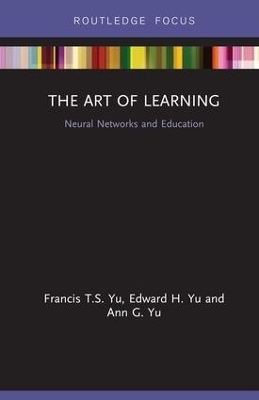
The Art of Learning
Crc Press Inc (Verlag)
978-0-8153-6129-9 (ISBN)
This book presents the idea that innovative ways of teaching and learning are very essential to retention and growth. Presented in 15 sections, the book starts with the common sense training on education and moves on to neural network operation. Throughout the book, the art of learning, associative, cognitive, and creative learning are stated and defined. Learning simplicity, information content as related to neural network learning are discussed. The author also discusses neural plasticity and adaptability in smarter neural networks.
If we know our human brain’s basic abilities and limitation then a better educational methods can be implemented.
Presents the idea that innovative ways of teaching and learning are very essential to retention and growth
Discusses major differences and constraints between neural network and computer
Presents the significances of learning simplicity and information content as related to neural network learning are included
Stresses the neural network learning capabilities and limitations and their role in developing more efficient learning techniques
Francis T. S. Yu received his B.S.E.E. degree from Mapua Institute of Technology Manila, Philippines, and his M.S. and Ph.D. degrees in Electrical Engineering from the University of Michigan. He has been a consultant to several industrial and governmental laboratories. He is an active researcher in the fields of optical signal processing, holography, information optics, optical computing, neural networks, photorefractive optics, fiber sensors, and photonic devices. He has published over five hundred papers, in which over three hundred are referred. He is a recipient of the 1983 Faculty Scholar Medal for Outstanding Achievement in Physical Sciences and Engineering, a recipient of the 1984 Outstanding Researcher in the College of Engineering, was named Evan Pugh Professor of Electrical Engineering in 1985 at Penn State, a recipient of the 1993 Premier Research Award from the Penn State Engineering Society, was named Honorary Professor in Nankai University in 1995, is the corecipient of the 1998 IEEE Donald G. Fink Prize Paper Award, was named Honorary Professor of the National Chiao-Tung University in Taiwan, and is the recipient of the SPIE 2004 Dennis Garbor Award. He has served as an associate editor editorial board member, and a guest editor for various international journals. He is the author and coauthor of nine books. Dr. Yu is a life fellow of IEEE and a fellow of OSA, SPIE, and PSC. Edward H. Yu is a teacher, writer, and the author of The Art of Slowing Down: A Sense-Able Approach to Running Faster(Panenthea Press) and The Mass Psychology of Fittism: Fitness, Evolution & the First Two Laws of Thermodynamics (Undocumented Worker Press). Ann G. Yu lives and works in Los Angeles.
Preface. Motivation. Common Sense on Training (or Education). Neural Networks. Major Differences between Neural Networks & Computers. Memory-Based Neural Networks. Artificial Neuron Operation. Associative Memory Neural Network. Supervised and Unsupervised Learning Neural Networks. Cognitive Learning (The Art of Understanding). Learning Simplicity (The Basics). Information Content and Neural Network Learning. Brain (Neural Network) Plasticity and Adaptively. Innovative Education (i.e., Training). Search for Innovative Education. A Few Thoughts to Share. Leadership in Education.
| Erscheinungsdatum | 18.09.2018 |
|---|---|
| Zusatzinfo | 60 Illustrations, black and white |
| Verlagsort | Bosa Roca |
| Sprache | englisch |
| Maße | 138 x 216 mm |
| Gewicht | 453 g |
| Themenwelt | Geisteswissenschaften ► Psychologie ► Allgemeine Psychologie |
| Geisteswissenschaften ► Psychologie ► Pädagogische Psychologie | |
| Geisteswissenschaften ► Psychologie ► Verhaltenstherapie | |
| Informatik ► Theorie / Studium ► Künstliche Intelligenz / Robotik | |
| ISBN-10 | 0-8153-6129-7 / 0815361297 |
| ISBN-13 | 978-0-8153-6129-9 / 9780815361299 |
| Zustand | Neuware |
| Informationen gemäß Produktsicherheitsverordnung (GPSR) | |
| Haben Sie eine Frage zum Produkt? |
aus dem Bereich


